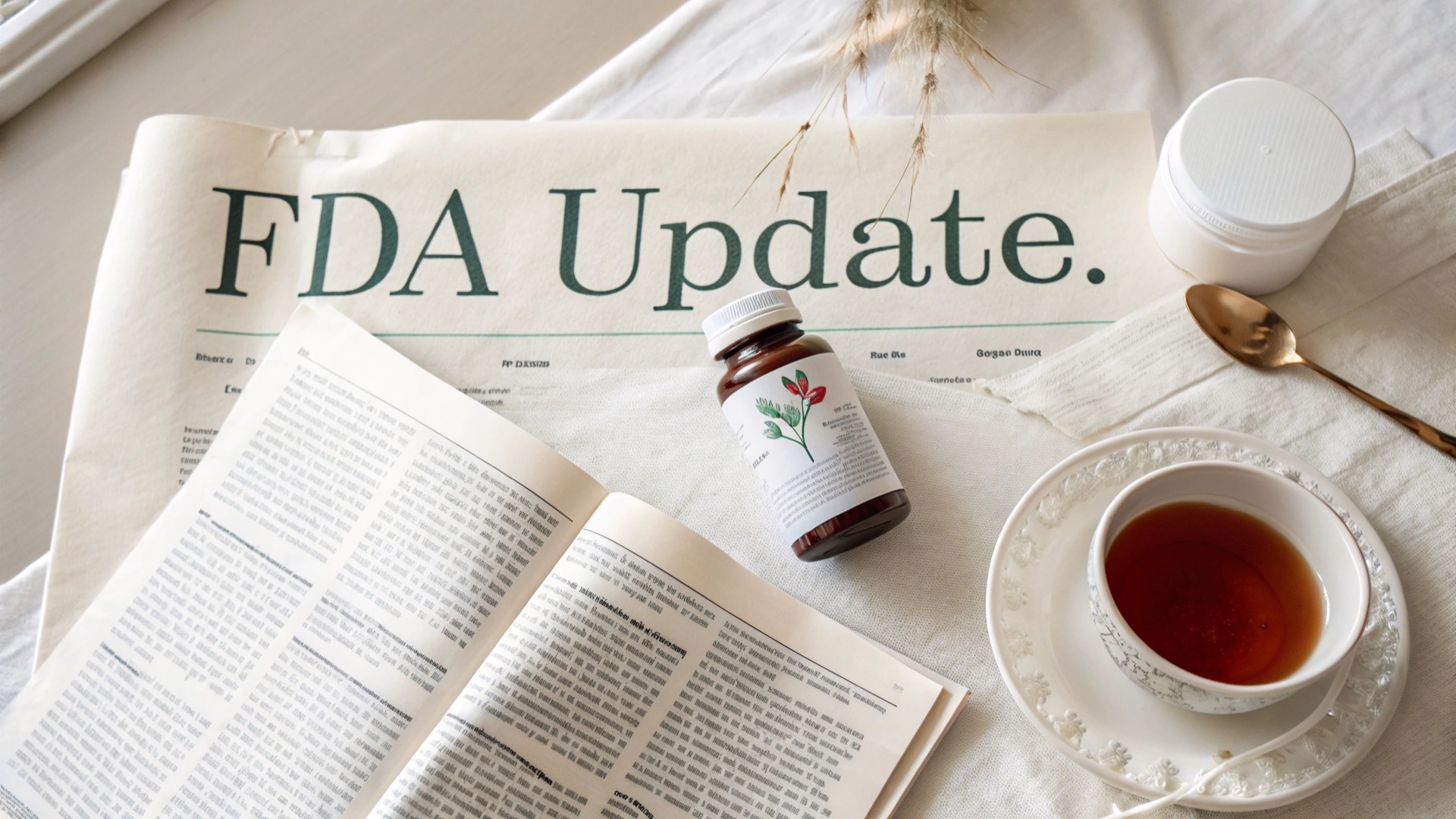Key takeaways
- NMN increases NAD⁺ levels, which play a crucial role in DNA repair, energy metabolism, and cellular aging.
- Research shows benefits in brain health, cardiovascular function, metabolic support, and physical endurance, particularly in older adults.
- Typical dosages range from 250 to 900 mg/day and are generally well tolerated; however, users should stay informed about evolving FDA guidance, particularly through 2025.
Overview
Aging is a process we all face, but as science advances, so do potential interventions to help us age gracefully and healthfully. One of the most researched and promising supplements in the anti-aging sphere is Nicotinamide Mononucleotide (NMN).
Touted as the potential key to slowing the aging process, thanks to its role in boosting NAD⁺ levels, NMN is making waves across scientific research and the health supplement industry.
NMN has recently emerged as a new supplement in the anti-aging and longevity market, gaining popularity due to recent clinical research and innovative formulations designed to support cellular health in 2025.
This comprehensive guide walks through everything you need to know about NMN supplements, from how they work to their benefits, recommended dosage, and safety concerns.
Whether you’re new to NMN or looking to deepen your understanding, this article provides an evidence-based exploration of this fascinating compound.
What is NMN, and how does it work?
NMN, short for Nicotinamide Mononucleotide, is a molecule derived from vitamin B3 (niacin). It serves as a precursor to Nicotinamide Adenine Dinucleotide (NAD⁺), a critical coenzyme involved in numerous cellular functions, including metabolism, DNA repair, and energy production. NAD⁺ is integral to various biological processes in the human body.
As we age, NAD⁺ levels in our bodies decline due to the increased activity of NAD-consuming enzymes, such as CD38 and PARPs, which are involved in DNA repair and inflammatory responses.
This decline is strongly associated with aging and age-related diseases, including cognitive decline, metabolic dysfunction, and cardiovascular diseases. The reduction in NAD⁺ also contributes to mitochondrial dysfunction and age-linked changes, including alterations in gene expression and cell growth.
NMN works within the salvage pathway, efficiently converting into NAD⁺ to replenish cellular reserves. NAD⁺ is a vital coenzyme present in all living cells, and NMN, along with other precursors like nicotinic acid, helps maintain NAD⁺ levels.
By boosting NAD⁺ levels, NMN activates key longevity pathways, including the SIRT1 pathway, which supports DNA repair, cellular resilience, and energy homeostasis. NMN is transported across cell membranes via specific transporter proteins, facilitating its uptake and effectiveness within cells.
What are NMN supplements?
NMN supplements are dietary supplements formulated with Nicotinamide Mononucleotide (NMN), a naturally occurring compound found in the human body and in particular, natural foods like cow’s milk. As a direct precursor to NAD⁺, NMN plays a vital role in supporting energy metabolism, cellular repair, and overall metabolic health.
Available in convenient forms such as NMN capsules and powders, these supplements are designed for easy oral intake. The pure form of NMN is rapidly absorbed, making it an effective way to boost NAD⁺ levels and promote healthy aging. Many people choose NMN supplementation to help maintain insulin sensitivity, support cardiovascular health and reduce age-associated weight gain.
Research suggests that taking NMN supplements may offer a broad range of metabolic benefits, including improved energy production, enhanced skin elasticity, and better stress management. NMN supplementation has also been linked to positive effects on cognitive function, neuronal function, and sleep quality, making it a popular choice for those seeking to support brain health and overall well-being.
While NMN is a naturally occurring compound found in some foods, its concentration is typically low; therefore, supplements provide a more efficient way to achieve the potential benefits. As with any dietary supplement, it’s essential to consult a healthcare professional before taking NMN, especially if you have underlying health conditions or are taking other medications.
Proven benefits of NMN supplementation
NMN has gained traction in the longevity field for its ability to elevate NAD⁺ levels, but how strong is the evidence behind its effects? Both preclinical and human studies have investigated the potential of NMN across multiple health domains, including metabolism, cognition, cardiovascular health, and muscle health. Here’s a breakdown of what the science currently tells us based on peer-reviewed findings in both animal models and human clinical trials.
Benefits shown in animal studies
Animal research offers a wealth of insights into NMN’s potential. Studies have shown:
- Extended lifespan: NMN supplementation increases lifespan in animal models by boosting NAD⁺ and activating sirtuins, which regulate cellular aging. Notably, studies in older mice have shown increased responsiveness to NMN, with improvements in health markers and mitigation of age-related decline.
- Improved metabolism: NMN enhances insulin sensitivity and supports metabolic functions, offering potential benefits for conditions such as obesity and type 2 diabetes.
- Cognitive and cardiovascular boosts: A human clinical study demonstrated that NMN supplementation improved memory performance and subjective well-being in older adults, likely through NAD⁺-mediated mechanisms.
- Physical performance: Mice treated with NMN demonstrated increased endurance and improved recovery times during exercise studies. NMN has also been shown to impact muscle tissue, enhancing muscle metabolism and insulin sensitivity, though evidence in humans remains limited.
Animal models of accelerated aging, such as Werner syndrome, have also been used to study the effects of NMN, suggesting potential benefits for age-related disorders.
Benefits confirmed in human clinical trials
Although human research is newer, the results are equally promising. A pivotal clinical trial on NMN supplementation demonstrated:
- Significant NAD⁺ boosts: At doses of 300–900 mg/day, blood NAD⁺ levels markedly increased within 30-60 days, with a considerable difference compared to placebo. Increases in plasma NMN were observed, indicating effective absorption.
- Improved physical performance: Participants demonstrated increased performance in a six-minute walk test, with the strongest results observed in the 600-900 mg/day groups and a significant difference compared to the placebo.
- Stabilized biological age: For participants taking NMN, biological aging markers, evaluated via the Aging.AI calculator, remained consistent compared to placebo groups that showed age progression.
- General well-being: Participants reported improved subjective health scores on the SF-36 health survey.
Many clinical trials are conducted in healthy individuals to assess the safety and efficacy of NMN supplementation. Long-term administration studies are crucial for evaluating sustained benefits and ensuring ongoing safety for consumers. To date, most clinical trials last 4 to 12 weeks; longer-duration studies, extending beyond one year, are still lacking.
Recommended dosage and usage
To experience the full benefits of NMN supplementation, it’s essential to get the dosage, form, and timing right. Research-backed protocols suggest that how and when you take NMN can significantly influence its absorption, effectiveness, and alignment with your body’s natural biological rhythms.
- Typical dosage range: Clinical trials typically use NMN doses of 250–900 mg/day, with 300 mg showing a good balance of effectiveness and safety. Starting with smaller doses and gradually increasing is advisable for most individuals. However, higher doses of NMN may increase the likelihood of digestive discomfort, nausea, or abdominal pain, especially during initial use.
- Forms: NMN is widely available in multiple forms, including capsules, powders, and sublingual tablets. Sublingual forms maximize absorption directly into the bloodstream.
- Timing: For optimal results, experts recommend taking NMN in the morning on an empty stomach, aligning with the body’s natural NAD⁺ production rhythms. This aligns with studies showing that NAD-dependent enzymes, such as SIRT1, play a critical role in regulating circadian gene expression through interactions with the CLOCK-BMAL1 complex.
Potential risks and safety concerns
While research indicates NMN supplementation is generally well tolerated, there are important considerations to keep in mind:
- Short-term safety: Human studies suggest NMN is safe for up to 90 days. All tested dosages up to 900 mg/day did not produce significant side effects.
- Long-term administration: The safety of long-term NMN administration is still under investigation, and further research is needed to confirm its effects over extended periods.
- High doses: Animal studies using extremely high doses (greater than 1000 mg/kg) suggest potential liver toxicity, though this has not been confirmed in human trials.
- Drug interactions: NMN might interact with medications for blood pressure or diabetes management. Consulting a healthcare professional before use is crucial.
- Regulation: In 2022, the FDA ruled that NMN could not be sold as a dietary supplement because it had been previously classified as a drug under investigation. However, as of November 2024, the FDA issued a public statement confirming that it will not prioritize enforcement actions against NMN supplement manufacturers until at least July 31, 2025. This means NMN remains available in the U.S. market for now, although its long-term regulatory future is uncertain.
NMN vs. other NAD⁺ precursors
| Feature | NMN | Nicotinamide Riboside (NR) | Niacinamide (NAM) | Niacin (NA) / Nicotinic Acid |
| Pathway to NAD⁺ | Direct precursor | Converts to NMN first | Can inhibit sirtuins | Nicotinic acid is a natural precursor in NAD⁺ biosynthesis |
| Absorption Evidence | Strong human data | Proven NAD⁺ boosts | Moderate | Less studied |
| Common Side Effects | Minimal | Mild digestive discomfort | None | Flushing, irritation |
| Market Availability | High | Moderate | Moderate | Low |
Nicotinic acid, also known as niacin, is a crucial precursor in the NAD⁺ biosynthesis pathway, contributing to the maintenance of NAD levels and supporting cellular health. However, there is a significant difference between NMN and other precursors, such as nicotinic acid, in terms of absorption and side effect profile; NMN is absorbed more efficiently and is less likely to cause flushing or irritation.
Choosing the right NMN supplement
Given the growing popularity of NMN, the market is flooded with options. Here’s how to ensure you’re purchasing a quality product:
- Verify form: Look for β-NMN, the most bioavailable and studied form.
- Third-party testing: opt for supplements with GMP (Good Manufacturing Practice) certification and transparent labeling.
- Avoid overpromises: Be cautious of products that make unsubstantiated claims or offer doses higher than 900 mg without precise safety data.
For the latest subscription details, including flexible plans and cost-saving options, visit the official website.
Bottom line
NMN supplements hold immense potential to help you age healthfully by supporting NAD⁺ levels and optimizing critical cellular processes.
While human research is still gaining momentum, early results are promising, especially for metabolic health, physical performance, and general well-being. Ongoing research is also investigating the role of NMN in promoting healthy longevity, particularly in older adults.
Nevertheless, NMN works best when paired with a holistic approach to healthy aging, which includes regular exercise, a nutritious diet, quality sleep, and effective stress management. As with any supplement, consider your individual goals and consult with a healthcare provider.
Frequently Asked Questions (FAQs)
- Will NMN cause dependency?
No, NMN does not work like addictive substances. Its effects depend on consistent supplementation to maintain NAD⁺ levels, but there’s no evidence of dependency.
- Can I combine NMN with NR?
Yes, you can combine NMN (Nicotinamide Mononucleotide) with NR (Nicotinamide Riboside), but current research shows limited added benefit. Both act as NAD⁺ precursors and primarily affect the same biological pathways, so combining them may not significantly enhance outcomes.
- What is the best time to take NMN?
Taking NMN in the morning is generally recommended, as it aligns with your body’s natural circadian rhythm and NAD⁺ production cycle. This timing may also enhance the effectiveness of NAD⁺-dependent enzymes, such as SIRT1, which are more active earlier in the day.
- Is NMN legal in the U.S. in 2025?
Yes. While the FDA has stated that NMN is not recognized as a dietary supplement due to its investigation as a drug, the agency has issued a non-enforcement policy through July 31, 2025, allowing NMN to remain available for sale in the U.S. market during this period.
References
- Yoshino, M., et al. (2021). Daily oral nicotinamide mononucleotide increases muscle insulin sensitivity in prediabetic women. Science, 372(6547), 1224–1229.
- Liao, B., et al. (2022). Nicotinamide mononucleotide supplementation enhances aerobic capacity in healthy older adults: A randomized, double-blind, placebo-controlled study. J Gerontol A Biol Sci Med Sci.
- Wei, W., et al. (2021). NMN improves cognitive function and sleep quality in older adults. The Journals of Gerontology: Series A.
- Fang, E.F., et al. (2019). NAD+ augmentation restores mitophagy and limits accelerated aging in Werner syndrome. Nature Communications, 10, Article 5284.
- Grozio, A., et al. (2019). Boosting NAD+ biosynthesis via nicotinamide mononucleotide promotes DNA repair in aged tissues. Cell Reports, 28(2), 502–513.e4.
- Chini, C.C., et al. (2020). CD38 ecto-enzyme in immune cells is a major NAD+ consumer during aging. Nature Metabolism, 2, 735–747.
- Irie, J., et al. (2020). Effect of oral administration of nicotinamide mononucleotide on clinical parameters and NAD metabolism in healthy Japanese men: a randomized, double-blind, placebo-controlled, parallel-group trial. Endocrine Journal, 67(2), 153–160.
- Nakahata, Y., et al. (2009). The NAD+-dependent deacetylase SIRT1 modulates CLOCK-mediated chromatin remodeling and circadian control. Cell, 134(2), 329–340.








